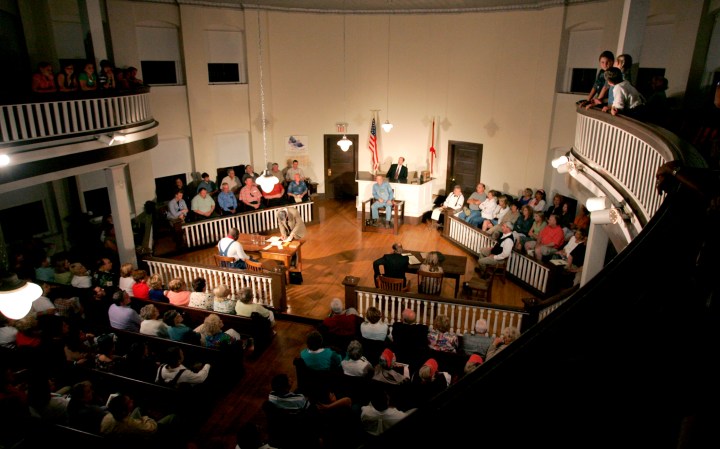Media
To Kill a Mockingbird turns 50, becomes a bestseller again

She’s only written one novel, but it was an instant classic that defined race in America and swiftly became a setwork in English-language schoolrooms across the globe. On Sunday Harper Lee’s To Kill a Mockingbird turned 50, and in celebration soared back up the sales charts.
In 1964, four years after To Kill a Mockingbird was first published, the book’s author Harper Lee resolved that she would never again give an interview about it as long as she lived. At first the publishers had warned Lee that the novel, her first – and, it would turn out, her only – was going to be a modest seller, but after 41 weeks on the bestseller list it won the Pulitzer Prize. It was an instant classic, destined to become the most widely read text dealing with race in America, and after countless book tours, speaking engagements and one-on-one sessions with journalists, the author got tired of repeating herself.
She also refused over the years to write introductions for the book’s many reprints, remarking in 1995: “Introductions inhibit pleasure, they kill the joy of anticipation, they frustrate curiosity. The only good thing about Introductions is that in some cases they delay the dose to come. Mockingbird still says what it has to say; it has managed to survive the years without preamble.”
On Sunday 11 July, To Kill a Mockingbird turned 50, and the anniversary was commemorated in media outlets as wide-ranging as the Washington Post, BBC and Sydney Morning Herald. Writing in the Guardian on Saturday, acclaimed Nigerian novelist Chimamanda Ngozi Adichie stated: “Rereading the novel as an adult, I came to admire it for its clear-eyed depiction of American tribalism in its three major manifestations: race, class and region. Few contemporary literary American novels have such a sweep and fewer have the confidence to take on social issues in the way Harper Lee does. Much literary writing today about racism is cloaked in irony or in so much lyricism that it becomes gaseous. Lee refuses to hide behind aesthetics. Her writing is so beautiful, so steady and even and limpid, that she might have evaded confronting these tribalisms head-on, but she doesn’t.”
The novel, still a setwork in schools across the world, is narrated by the six-year-old Scout Finch, and the evocation of childhood is one of its enduring characteristics – Lee’s gift for narration, her highly visual style, her ambiguous switching from the perspective of the child to the adult looking back, all allow for the theme of loss of innocence to be fully explored and mined. Of the other characters, Scout’s father Atticus Finch has become synonymous with the image of the model lawyer and moralist; the enigmatic Boo Radley has become a stand-in for kind and charming recluses everywhere.
But it’s Lee’s ear, perhaps, her pitch-perfect rendering of voice and dialogue, that has been most responsible for the fact that the book’s been read and re-read through the generations. Take this extract from the opening chapter:
Early one morning as we were beginning our day’s play in the back yard, Jem and I heard something next door in Miss Rachel Haverford’s collard patch. We went to the wire fence to see if there was a puppy – Miss Rachel’s rat terrier was expecting – instead we found someone sitting looking at us. Sitting down, he wasn’t much higher than the collards. We stared at him until he spoke:
“Hey.”
“Hey yourself,” said Jem pleasantly.
“I’m Charles Baker Harris,” he said. “I can read.”
“So what?” I said.
“I just thought you’d like to know I can read. You got anything needs readin’ I can do it…”
“How old are you,” asked Jem, “four-and-a-half?”
“Goin’ on seven.”
“Shoot no wonder, then,” said Jem, jerking his thumb at me. “Scout yonder’s been readin’ ever since she was born, and she ain’t even started to school yet. You look right puny for goin’ on seven.”
“I’m little but I’m old,” he said.
Now, thanks to such passages and the marketing push it’s received from the anniversary celebrations, the book is back up near the top of the sales charts. On 9 July, To Kill a Mockingbird was number 14 in The Bookseller magazine’s official UK top 50, and was tracking first in the bestseller list of Foyles, Britain’s largest independent bookstore. It’s also in the top 10 of UK chain Waterstone’s, and these are only the results for Britain – in the United States, where the celebrations have been much more widespread, sales have been even higher.
To date, at age 84, Lee has seen 40 million copies of her novel sold around the world. The only South African novel anywhere close to that is Alan Paton’s Cry, the Beloved Country, at 15 million.
By Kevin Bloom
Read more: Guardian, Extract from To Kill a Mockingbird
Photo: Spectators become part of the play as they watch a stage adaptation of “To Kill A Mockingbird” at the old Monroeville County Courthouse in Alabama, Lee’s home town. Some historians believe Lee may have based her story on an actual rape trial that took place in the courtroom. (REUTERS/Tami Chappell)















 Become an Insider
Become an Insider